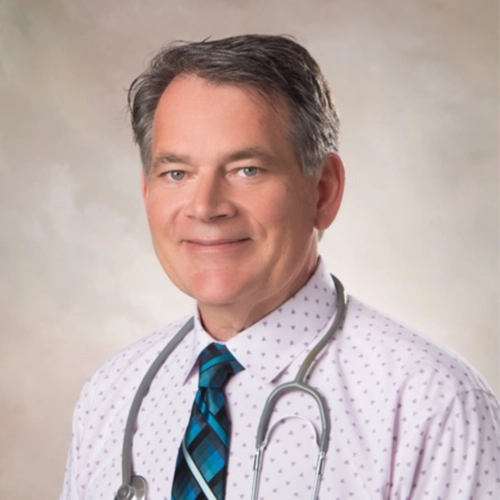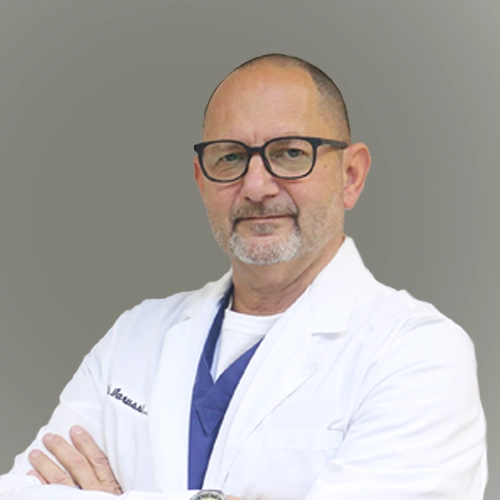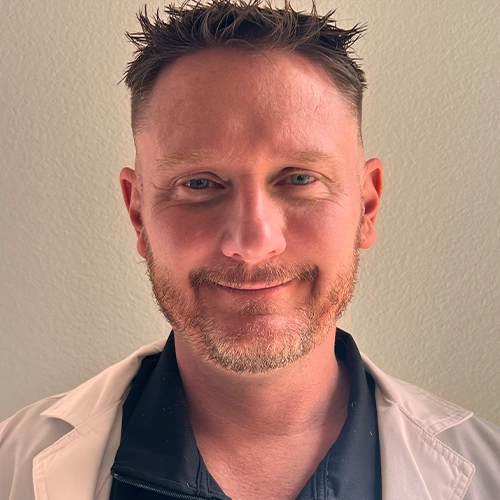
Donato Barillo, MD, JD, MS, Medical Director

Rick Iarussi, MD

Michael Meng, DC RMSK RN FNP-BC
SPIRITUAL AND COMMUNITY SERVICE
Parishioner Blessed Trinity Catholic Church, Ocala FL.
Catholic Bible School of Michigan, presently enrolled, Jackson, MI.
Sacrament of Baptism, St. Mary of Redford Church, Detroit MI.
Dr. Borrillo has deployed on humanitarian medical missions to El Salvador, Hurricane Katrina in 2005 with FEMA/DMAT, he volunteers at the Mother Teresa House for the care of the terminally ill. He regularly teaches medical students at The University of Toledo Medical Center community free clinic.
EDUCATION
Doctor of Medicine
SUNY Buffalo, 1990
Master of Science in Aerospace Medicine
NASA Grant Program, 1996
Aerospace and Occupational Medicine Residency
Board Certified by American Board of Preventive Medicine
Juris Doctorate
Case Western Reserve School of Law, 1994 DJB 1/1/2022
Master of Science in Immunology
Roswell Park Cancer Institute, 1990
Bachelor of Arts, Biochemistry
Canisius College, 1986
FACULTY & MEDICAL DIRECTOR
Visiting Scholar, Cambridge University, England, 1998 -1999
Faculty staff, Embry-Riddle Aeronautical University, 1999-2000
Adjunct faculty, Wright State University, Dayton Ohio 2002 – 2010
Adjunct faculty, University of Toledo Medical Center, 2012 – 2018
Volunteer Attending UTMC free clinic, 2012 – present
Medical Director Minutemen MCO, Cleveland Ohio, 2018 – present
Medical Director, Reliable Drug Testing clinic, Toledo Ohio, 2015 – present
Certified Medical Review Officer
|
WORK EXPERIENCE 2007 – PRESENT, PRIVATE PRACTICE Concentra urgent care clinics in Florida. Medical staff physician, Sparrow Hospital, Lansing, Michigan, McLaren St Luke’s Hospital, Maumee, Ohio, and The Toledo Hospital, Ohio. Collaborating physician with Everside healthcare system with midlevel providers; delivering individualized care across the continuum of home care, urgent care, assisted living, and extended care facility patients. 2009 – PRESENT, OF COUNSEL, ZOLL & KRANZ, LLC (2015-2016 FISHER BROYLES LLC) 2012 – 2016, MEDICAL ADVISOR, CHRYSLER-FIAT, TOLEDO ASSEMBLY PLANT 2001– 2012, MEDICAL DIRECTOR, OCCUPATIONAL MED, PROMEDICA HEALTH SYSTEM 1996 – 2001, FLIGHT SURGEON, UNITED STATES AIR FORCE Major, U.S. Air Force Special Operations Command Flight Surgeon, Honorable Discharge, 1996 – 2001 Awards and Service: Air Force Commendation Medal, Joint Meritorious Service Award, Kosovo Medal, Society of USAF Flight Surgeon’s Julian E. Ward Award for Outstanding Achievement in the Art and Science of Aerospace Medicine, Resident of the Year Award (across civilian and all military branches), Special Operations Flight Surgeon of the Year with 30 Combat Sorties. Consultant, Judge Advocate General’s Office, 1996 – 2001 |
SummaryBoard Certified Anesthesiologist with 31 years professional experience including 20 years administrative experience as department director and 2 ½ years as system-wide Director of Medical Operations. Recruited 3 times to revamp and revitalize struggling departments with successful achievement of objectives each time. Proficient in all types of anesthesia with particular interest and substantial experience in regional techniques and obstetric anesthesia.
Education1977-1983 Youngstown State University B.S.
1979-1983 Northeastern Ohio Universities COM M.D.
Professional1983-1984 Youngstown Hospital Association Internship Training Northeastern Ohio Universities COM
1984-1986 University Hospitals of ClevelandResidency
Case Western Reserve University
Professional 2015-presentDirector of Medical Operations
Experience ProMedica Physicians Anesthesiology
Toledo, Ohio
2014-presentVice Chairman of Anesthesiology
2014 – 2015Director of Obstetric Anesthesiology
The Toledo Hospital, Toledo, Ohio
2012-presentStaff Anesthesiologist
ProMedica Anesthesia Consultants
ProMedica Physicians Anesthesiology
Toledo, Ohio
2004 – 2012Medical Director of Anesthesiology
Staff Anesthesiologist
Parkview Whitley, Huntington and Noble Hospitals,
Fort Wayne, Indiana
Director of Pain Management Center
Parkview Whitley Hospital
Columbia City, Indiana
1997 – 2004Department Chairman of Anesthesiology Services
Director, The Pain Management Center
Staff Anesthesiologist
St John Westshore Hospital, Westlake, Ohio
1997 – 2004 Staff Anesthesiologist
The Surgery Center, Middleburg Heights, Ohio
1993 – 1997 Co-Director, The Pain Management Center
Marymount Hospital, Garfield Heights, Ohio
1992 – 1997 Department Chairman, Anesthesiology Services
Marymount Hospital, Garfield Heights, Ohio
1990 – 1997 Staff Anesthesiologist
Marymount Hospital, Garfield Heights, Ohio
1986 – 1997Staff Anesthesiologist
Meridia Euclid Hospital, Euclid, Ohio
Licensure
Indiana Active
North Carolina Active
Board Anesthesiology ABA 1988
CertificationVoluntary Recertification ABA 2009
AccreditationsBLS, ACLS and PALS recertified 5/2016
Affiliations
American Society of Anesthesiologists
Ohio Society Of Anesthesiology
Curriculum Vitae
Education
D.C. Doctoral Degree in Chiropractic. Cleveland Chiropractic College, Kansas City, Missouri. 2003.
B.S. Biology, Minor Chemistry. Truman State University, Kirksville, Missouri 1999.
RMSK Registered Physician of Musculoskeletal Radiology. 2005. American Institute of Ultrasound in Medicine.
A4M/MMI Board Certification in Integrative and Anti-aging Medicine – currently enrolled. 2023. George Washington University.
R.N. Registered Nurse. International College of Health Sciences, 2019.
B.S.N. Bachelor of Science in Nursing. University of Texas at Arlington, 2001.
FNP. Family Nurse Practitioner. United States University – 2023.
Experience
|
2018 – 2020 |
|
Owner / Partner |
2019-2020 |
|
|
2010-2017 |
|
|
2005-2019 |
|
|
2006-2021 |
|
|
2003-current |
|
|
2010-current |
|
|
2009 – 2015 |
|
|
2012-current |
|
|
2014-2021 |
|
|
2020-current |
|
|
2022-current |
|
|
2007-2009 |
Publications/Presentations
|
Management of Dupuytren Contracture With Ultrasound-Guided Lidocaine Injection and Needle Aponeurotomy Coupled With Osteopathic Manipulative Treatment |
February 2011 |
|
|
Platelet-rich plasma therapy as a first-line treatment for severe Achilles tendon tear: a case report |
February 2011 |
|
|
Injection of Platelet-Rich Plasma in Patients with Primary and Secondary Knee Osteoarthritis: A Pilot Study. The American Journal of Physical Medicine & Rehabilitation. Nov 20, 2010 online. Print Dec 2010. |
December 2010 |
|
|
Phantom bladder Sessation Case Report: International Journal of anestheiology Research 2014 |
June 2014 |
|
|
Ultrasound Evaluation of the Rotator Cuff Interval: International Journal of Anesthesiology Research April 2018 |
March 2018 |
|
|
Comprehensive Ultrasound Imaging Atlas of Painful Conditions. Elsevier publishing. |
2017 |
|
|
Comprehensive Atlas of the Foot and Ankle Imaging Elsevier publishing. |
2018 |
|
|
Comprehensive Atlas of Ultrasound-guided Pain Management Injection Techniques. |
2019 |
Teaching Experience
Professor of Anatomy and Physiology |
2003 |
|
Professor of Anatomy and Physiology |
2003 |
|
|
2004 – Present |
|
|
2016 – Present |
|
|
2014 – Present |
|
|
2023 – Present |
|
|
2020 – Present |
|
|
2022 – Present |
CATHOLIC TEACHING ON STEM CELL RESEARCH
Part I: Introduction to the Ethics and Science
• This winter the General Assembly will consider legislation on stem cell research here in NC
• Many are pushing for the state to fund human embryonic stem cell research
• We as Catholics need to educate ourselves and respond to this serious issue
Catholic Teaching on Life
The starting point for evaluating stem cell science
Life is sacred
The central fact at the core of our Church’s teaching on life is that life is sacred. God created us “in his
image” and called His creation “very good” (Gn 1: 27, 31); from the beginning of each person’s existence
God has given that person the remarkable gift of life, which reflects His own life. Elaborating on this gift, the
Catholic Church teaches that “human life is sacred because from its beginning it involves ‘the creative action
of God’ and it remains forever in a special relationship with the Creator” (Donum Vitae, intro 5). This core
value of human life cannot be removed by any circumstance; every patient dying of cancer, every prisoner on
death row, every mentally handicapped person, every embryo frozen in a fertility clinic, every person in
poverty is beloved by God and each of their lives is sacred.
God’s love calls us to action
God loves us. Christ took on human nature out of love, in order to offer salvation to us. However, he calls us
not only to receive His love, but to give love to each other; as he says to the apostles at the Last Supper “love
one another as I love you” (Jn 15:12). This love takes many forms, and among them is love for the sacred life
in each person. In this light, the commandment “you shall not kill” establishes the minimum requirement of
what we must not do, but Christ’s command to love as He loves pushes us to aim for the best we can
accomplish rather than merely avoid the worst. John Paul II captured this when he wrote that the
commandment not to kill “culminates in the positive commandment which obliges us to be responsible for our
neighbors as for ourselves: ‘you shall love your neighbor as yourself’” (Evangelium Vitae 40).
“Who is my neighbor?” (Lk 10:29)
With regard to the pending legislation in North Carolina, our neighbors are our embryonic brothers and sisters
whom researchers propose to create through cloning or obtain from fertility clinics and to kill in the lab for
embryonic stem cells. Despite the good the researchers hope to accomplish, we can never use evil as a tool to
accomplish good.
Stem Cell Science
What is a stem cell?
A stem cell is a “precursor” cell, an undifferentiated cell, capable of producing more specialized types of
cells; just as the stem of a plant grows and becomes leaves and berries, stem cells give rise to the developed
cells that form the organs and tissues of the body, such as brain cells, heart cells, etc.
What are “embryonic stem cells” vs. “adult stem cells”?
Embryonic stem cells are named for where they come from: embryos. In the first days after conception the
new person develops the embryonic stem cells that develop into all the organs and different types of tissue in
Look for more bulletin inserts on this topic for the next two weeks.
the growing body. Once these embryonic stem cells have made the first steps in developing into specific
types of tissues, they are then called adult stem cells. In the analogy to a plant, an embryonic stem cell would
be at the base of the stem while an adult stem cell would be higher up on the stem, where the stem forks into
branches.
Why are researchers interested in stem cells?
The most prominent and most often mentioned reason is treatment of disease. Because stem cells can form
into specialized cell types, the idea is that they could treat illnesses in which diseased cells and tissues do not
work normally. Adult stem cells already are used to treat many diseases (i.e., bone marrow transplants are
actually adult stem cell transplants!)
Where can you obtain stem cells?
• Adult stems cells are all over the body: in bone marrow, in blood from a baby’s umbilical cord, in the
liver, in the skin, etc.
• Embryonic stem cells come only from embryos, and obtaining these cells involves destroying the
embryo to remove the stem cells. Thus, adult stem cells can come from a tissue sample from a willing
donor, but embryonic stem cells come from killing a human at the earliest stage of life.
Where would researchers obtain embryos?
1. From the many embryos “left over” after IVF (in vitro fertilization). Though frozen in suspended
animation, these youngest of our brothers and sisters are fully human and their lives are sacred.
2. From a process called “somatic cell nuclear transfer”: a scientist removes the genetic material (the
nucleus & DNA) from a woman’s egg and replaces it with the genetic material from a developed cell
(a “somatic” cell) such as a skin cell. This mixed cell acts like a fertilized egg and grows into an
embryo. This is how Dolly the sheep was made; i.e., this is cloning.
Recognize this important point: somatic cell nuclear transfer (SCNT) equals cloning, and human
cloning would be one of the major sources of embryos for research.
What are the moral issues with stem cell research?
• Adult stem cells: the Catholic Church fully supports research and treatment with adult stem cells.
Using adult stem cells for treatment and research is the same as using donated blood or a donated
kidney to study disease or treat a person with kidney failure.
• Embryonic stem cells: the Church firmly opposes human embryonic stem cell research because
obtaining embryonic stem cells involves killing embryos and because creating embryos by somatic
cell nuclear transfer means cloning humans. Both cloning and the killing of embryos violate the
sacred life we are given by God and thus are evil.
What can you do about this issue?
• To contact your legislators by email or phone start here:
Website: www.ncga.state.nc.us/GIS/Representation
Phone for the State Board of Elections: (919) 733-7173 (they will connect you to your County
